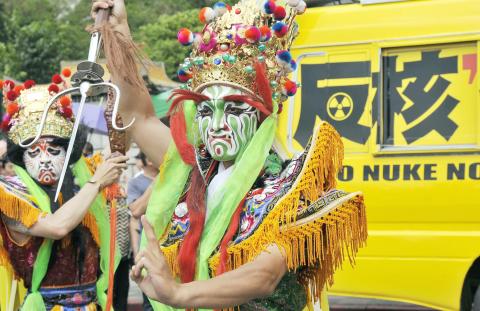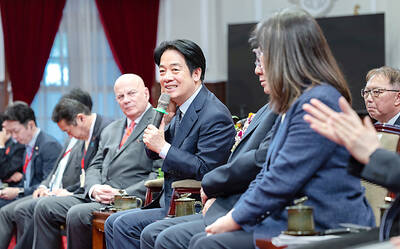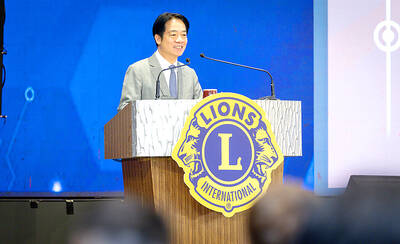Thousands of anti-nuclear protesters shouted “I am Taiwanese, I am against nuclear power” yesterday as they marched through downtown Taipei to call for an end to nuclear power in Taiwan on the eve of the anniversary of President Ma Ying-jeou’s (馬英九) second inauguration.
“We are extremely disappointed that the government has no regard for the threat that nuclear power poses to human life,” said Kao Cheng-yan (高成炎), a former chairman of the Taiwan Environmental Protection Union, which organized the march. “We believe that there is only one Taiwan, that people’s lives are invaluable and that there are other viable energy resource options.”
The protesters also urged the government to revise the phrasing of the proposed national referendum to decide the fate of the Fourth Nuclear Power Plant in New Taipei City’s (新北市) Gongliao District (貢寮), to amend the Referendum Act (公民投票法) and to modify the Nuclear Reactor Facilities Regulation Act (核子反應器設施管制法) so residents living within 50km of a nuclear plant will have the right to decide whether it operates.

Photo: Edward Lau / Reuters
In contrast to the nationwide anti-nuclear protests held in March, which drew a large number of young people who expressed their stances in artistic ways and were altogether more festive, the participants of yesterday’s rally ere mostly middle-aged and elderly. Members of civic groups, the Democratic Progressive Party (DPP) and the Taiwan Solidarity Union (TSU) also took part in the protest.
“Time has proven me right,” said former premier Chang Chun-hsiung (張俊雄) of the DPP, referring to the decision he made in 2000 when he was premier to halt construction of the Fourth Nuclear Power Plant despite facing extreme pressure to finish the project.
Although the plant’s construction was eventually resumed, many people are now aware of the danger posed by nuclear energy since the Fukushima Dai-ichi nuclear power plant disaster in Japan two years ago, he said.
“Is it right to establish a plant that provides only 20 to 30 years of electricity for our generation, but leaves behind harmful radioactive waste that will affect our offspring and the environment for about 240,000 years?” he said.
Former vice president Annette Lu (呂秀蓮) added that it is wrong that the government has already spent more than NT$300 billion (US$10 billion) of taxpayers’ money on the plant and forces the public to live in permanent fear of a nuclear disaster.
Meanwhile, Yang Mu-huo (楊木火), secretary-general of the Yenliao Anti-Nuclear Self-Help Association, said that although the proposal to hold a local referendum in New Taipei City was rejected by the Cabinet’s Referendum Review Committee on Thursday, advocates of the local poll would continue to push forward.
Several booths were set up along the march route, including one by the TSU that gave participants the chance to throw sandals bearing slogans such as “Impeach Ma” or “Terminate nuclear power” at two cardboard mannequins labeled “Ma’s black-hearted Cabinet” and “Bandit Ma, get out.”
The marchers converged at Ketagalan Boulevard in front of the Presidential Office at about 5pm to hear a series of speeches. They were then treated to performances by musician Chu Yueh-hsin (朱約信) — better known as Joy Topper (豬頭皮) — and rock band The Chairman (董事長樂團) in the evening.
The Taiwan Environmental Protection Union said a few of its representatives were to head to the Legislative Yuan after the event to stage 24-hour hunger strike, after which they would begin to hold a relay sit-in protest of unlimited duration.

Two US House of Representatives committees yesterday condemned China’s attempt to orchestrate a crash involving Vice President Hsiao Bi-khim’s (蕭美琴) car when she visited the Czech Republic last year as vice president-elect. Czech local media in March last year reported that a Chinese diplomat had run a red light while following Hsiao’s car from the airport, and Czech intelligence last week told local media that Chinese diplomats and agents had also planned to stage a demonstrative car collision. Hsiao on Saturday shared a Reuters news report on the incident through her account on social media platform X and wrote: “I

‘BUILDING PARTNERSHIPS’: The US military’s aim is to continue to make any potential Chinese invasion more difficult than it already is, US General Ronald Clark said The likelihood of China invading Taiwan without contest is “very, very small” because the Taiwan Strait is under constant surveillance by multiple countries, a US general has said. General Ronald Clark, commanding officer of US Army Pacific (USARPAC), the US Army’s largest service component command, made the remarks during a dialogue hosted on Friday by Washington-based think tank the Center for Strategic and International Studies. Asked by the event host what the Chinese military has learned from its US counterpart over the years, Clark said that the first lesson is that the skill and will of US service members are “unmatched.” The second

STANDING TOGETHER: Amid China’s increasingly aggressive activities, nations must join forces in detecting and dealing with incursions, a Taiwanese official said Two senior Philippine officials and one former official yesterday attended the Taiwan International Ocean Forum in Taipei, the first high-level visit since the Philippines in April lifted a ban on such travel to Taiwan. The Ocean Affairs Council hosted the two-day event at the National Taiwan University Hospital International Convention Center. Philippine Navy spokesman Rear Admiral Roy Vincent Trinidad, Coast Guard spokesman Grand Commodore Jay Tarriela and former Philippine Presidential Communications Office assistant secretary Michel del Rosario participated in the forum. More than 100 officials, experts and entrepreneurs from 15 nations participated in the forum, which included discussions on countering China’s hybrid warfare

MORE DEMOCRACY: The only solution to Taiwan’s current democratic issues involves more democracy, including Constitutional Court rulings and citizens exercising their civil rights , Lai said The People’s Republic of China (PRC) is not the “motherland” of the Republic of China (ROC) and has never owned Taiwan, President William Lai (賴清德) said yesterday. The speech was the third in a series of 10 that Lai is scheduled to deliver across Taiwan. Taiwan is facing external threats from China, Lai said at a Lions Clubs International banquet in Hsinchu. For example, on June 21 the army detected 12 Chinese aircraft, eight of which entered Taiwanese waters, as well as six Chinese warships that remained in the waters around Taiwan, he said. Beyond military and political intimidation, Taiwan